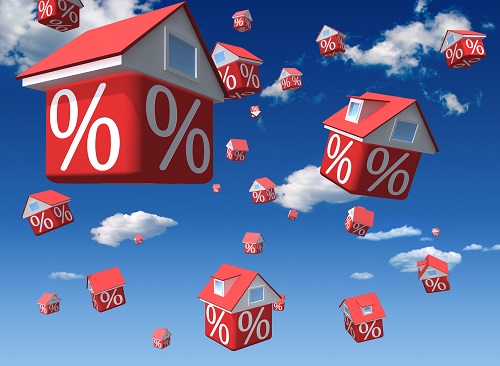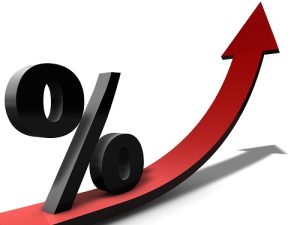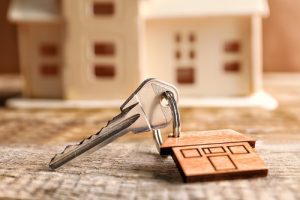
When interest rates for buying a home are high, it can make buying a home seem more challenging. But there are some surprising benefits to consider when the housing market is not as hot.
Buying A Home When Interest Rates Are Low
The downsides are clear. Higher interest rates mean higher monthly payments, which can make it harder for people to afford a home. For an average-priced house, recent increases in interest rates have added $300 to $400 to the monthly mortgage payment. Plus, it might be tougher to get approved for a bigger loan, making it harder to buy your dream home.
While people speculate about whether interest rates will keep going up, level off, or start going down in the coming months, many potential buyers are wondering whether to wait or take the plunge.
But mortgage interest rates don’t only depend on inflation; they are also influenced by the state of the economy and how many jobs are being created.
Throughout 2023, mortgage interest rates have gone up as interest rates have climbed. Some uncertainty arose during the spring due to negotiations about the national debt limit, but this was eased when President Joe Biden signed a bill in June to raise the debt limit (preventing a default).
However, despite these developments, mortgage interest rates have continued to rise. As of mid-October, the current average for a 30-year fixed mortgage rate reached 8.214%, according to the Moneywise mortgage rates index. Rates for investment properties are typically 1-2% higher since they are considered riskier for lenders.
Even though high interest rates affect how much homes cost, it’s not all bad news. Here are three reasons to think about buying a home in Myrtle Beach when interest rates are high:
Buying A Home When Interest Rates Are High
Benefit #1: Lower Housing Prices in Some Places
Higher interest rates can actually help lower housing prices in certain areas. Here’s how it works: High rates can make it difficult for some people to buy a home, which means there are fewer buyers in the market. When there are fewer buyers, it can put pressure on sellers to lower their prices to attract the buyers who are still out there.
However, while home prices did start to go down a bit earlier this year, they have since gone up again. This is because, even with higher mortgage rates, there aren’t enough homes for sale. Some homeowners are choosing to stay in their homes to keep their low interest rates, while building new homes has been slowed down by supply chain problems, rising costs, and a lack of workers.
Buying a Myrtle Beach home may still be too expensive for some people in certain places, but in others, buyers may have a better chance of negotiating lower prices.
 Benefit #2: Lower Risk for Buyers
Benefit #2: Lower Risk for Buyers
In 2020-2021, it was a seller’s market, and buyers had to compete for the limited number of homes available. Highly sought-after homes were being sold the same day they were listed, often with multiple offers driving prices well above the asking price.
This meant that many buyers were waiving certain conditions in their offers. Why? Because offers with fewer conditions are more likely to be accepted by the seller.
However, some of the conditions that were being waived were important ones, like the home inspection and appraisal. This put buyers at risk of buying a home that needed costly repairs or losing money if they backed out of the deal due to problems discovered later.
When interest rates are high, there are fewer buyers in the market, and homes tend to stay on the market longer. As a result, conditions like home inspections and appraisals are coming back into play. This is good news for buyers.
The Home Inspection
Buying a home involves many unknowns, which can be risky. You’re purchasing a physical asset that can wear out and have problems. It often happens that as soon as you move in, a major and expensive system like the heating and cooling system breaks down.
In a normal market, buyers have the chance to inspect the home before making a final commitment. If they don’t like what the inspection reveals, they can back out of the deal.
This is an important step in understanding what you’re buying. A licensed inspector will provide information about the age and condition of important parts of the home that a buyer needs to know. For example, how many years of life are left in the roof? Is the heating and cooling system working properly? Is there a crack in the foundation that could affect the home’s stability?
Homebuyers and real estate agents aren’t trained to spot defects, but inspectors are. While inspection results don’t usually lead to a lower offer price, they could be used for that purpose if problems are discovered that would require a significant investment.
The Appraisal
In 2020-2021, cash buyers and those who could make big down payments had an advantage. Bidding wars were driving prices above what the seller was asking, which meant the home wouldn’t appraise for the offered price.
This was a problem for borrowers. When getting a mortgage, the lender often requires an independent appraisal by a licensed appraiser to make sure the home is worth the amount of money they’re agreeing to lend.
As a result, only buyers with extra cash to cover the difference between the offer price and the appraised price could compete. Sellers would only accept offers above the asking price if the buyer were willing to sign an appraisal gap addendum.
Higher rates today haven’t gotten rid of bidding wars completely, but in general, buyers may have more time to make decisions and feel less pressure to take unnecessary risks.
For some people, buying a house is an investment, while for others, it’s a place to call home. Regardless of your reasons for wanting to own a home, if you’re ready to make the move, it might not make sense to wait just because interest rates are higher now.
After all, there’s no guarantee that rates will go down anytime soon. So if you don’t want to delay your plans, like moving to another city for a better job or being closer to an older family member, then waiting may not be the best choice. And if you’re currently renting, you’ve probably seen your rent go up, so you might prefer to build equity in your own home rather than pay higher rent.
 Should You Buy a Home Now?
Should You Buy a Home Now?
While some people are worried about a housing market crash, real estate agents who are actively working in the field aren’t seeing an imminent crash. They see a much-needed market correction. There’s still a low supply of homes, and demand from new buyers is strong. Plus, lending is much stricter than it was during the last housing crash in 2008.
Many homeowners today have positive equity in their homes, so the situation is quite different from 2008. In fact, forecasts from the National Association of Realtors (NAR) suggest that existing home prices will mostly stay stable, with the priciest region in the country, the West, seeing some price reductions.
If you can wait at least 12 to 24 months before buying a home, that might be a good decision. If inflation has gone down by then, the Federal Reserve is likely to start lowering interest rates. At that point, home prices may be a bit lower than they are now, and interest rates may be similar.
However, there’s no guarantee that rates will drop or that waiting will be the right choice. If they do drop, there could be a lot of pent-up demand, leading to more competition and bidding wars. Considering the benefits mentioned above can help you make the best decision for your situation.
Buying a Home When Interest Rates Are High
When interest rates are high, it’s natural to think it’s a bad time to buy a home. After all, higher rates mean higher monthly payments for the same amount of mortgage debt.
But that doesn’t mean there aren’t some advantages to buying when rates are high. You might face less competition from other buyers, and higher rates could put downward pressure on home prices.
Plus, you can always refinance later if rates go down, as long as your income and credit score are strong. You might even consider starting with a variable-rate loan, which can allow you to lower your rate over time without the need for a new loan and closing costs.
In the end, if you’re ready to move, don’t let higher interest rates stop you from buying a home. Call Full Potential Real Estate, LLC now.
Like our Facebook page for more information about buying or selling homes.
Full Potential Real Estate, LLC
Myrtle Beach, SC 29577
843-492-4537
http://fullpotentialrealestate.com/
We Serve – Carolina Forest SC, Surfside Beach SC, Conway SC, Myrtle Beach SC, North Myrtle Beach, Socastee, Little River, Murrells Inlet, Longs/Loris, Forestbrook

No comments:
Post a Comment